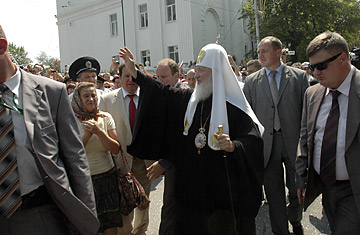
Russian Orthodox Patriarch Kirill waves to local faithful as he visits the port of Sevastopol on the Crimean peninsula in Ukraine on Sunday, Aug. 2, 2009
He said he was in Ukraine on a pilgrimage to promote spiritual unity. But his critics say he was on a mission from the Kremlin to buttress Moscow's influence over its neighbor.
Patriarch Kirill, the leader of the Russian Orthodox Church, was greeted by a mixture of protests and celebrations during his 10-day visit to Kiev, known to Russians as the "mother of all Russian cities." The trip, which began on July 27, was Kirill's first to Ukraine since he took over the role of Patriarch after the death of Alexy II in December 2008. Kirill toured holy sites across the country, met with political leaders and gave an interview on national television, all with the insistence that his visit had no political agenda. But some observers are skeptical, saying the patriarch was actually in the country to throw spiritual weight behind the Kremlin's attempts to halt Ukraine's move toward Europe and keep it within Russia's sphere of influence. "We've seen more of a Russian state official than a religious figure," says Olexandr Paliy, a historian at the Institute of Foreign Policy at the Ukrainian Ministry of Foreign Affairs' Diplomatic Academy. "The Church is being used as an instrument in the Kremlin's game."
The religious histories of Ukraine and Russia are closely — and sometimes controversially — intertwined. After Prince Volodymyr of Kiev was baptized into Christianity in 988, leadership of the Church became a crucial instrument in winning primacy among the princes of the Rus people who inhabited much of the territory of modern-day Ukraine, Belarus and Russia. The consolidation and spread of Muscovy's regional power during the 14th century coincided with the Church leader's move to the principality. The patriarch's full title is Patriarch of Moscow and All of Rus, a constant reminder of how the Russian Orthodox Church's power extends beyond Russia's borders.
Following the collapse of the Soviet Union in 1991, an independent church, known as the Kiev Patriarchate, was formed in Ukraine alongside the Moscow Patriarchate. It remains canonically unrecognized, but surveys show it has a comparable number of followers to the Russian branch of the Church. Together, the members of both branches make Ukraine one of the most religious countries in Europe; more than 60% of Ukrainians have been brought up in the Orthodox faith.
Last year, pro-Western President Viktor Yushchenko irked the Russian Orthodox leadership with an unsuccessful attempt to unite both patriarchates in Ukraine into one independent church, without involvement from Moscow. Kirill, too, would like to see both branches united, but not in a way that would satisfy Yushchenko — last week, the patriarch called for members of the two churches to unite under his leadership.
Yushchenko has similarly annoyed Russian political leaders with his attempts to move Ukraine toward Western structures such as the European Union and NATO. Moscow has responded with a series of threats and cuts to gas supplies to try to keep Ukraine in check, along with appeals to the countries' historical and cultural links. The Church, which enjoys strong relations with the Kremlin, is in a unique position to lend support to Moscow's attempts to keep Ukraine close, given its claims to spiritual authority over Ukrainian territory. "Our historical past is here, and our future will to a large extent be decided here," said Kirill on Ukrainian national television on July 28. "By our, I mean all of us, people who belong to the one civilization of ancient Rus."
Kirill took a swipe at the West for its pursuit of material well-being, suggesting that the desire to fill "one's stomach and pocket" was a base motive for moving toward Europe — a thinly veiled criticism of Ukraine's attempts to integrate with the E.U. Many thousands turned out to cheer the patriarch on his tour of Ukraine, but comments like that one also brought hundreds into the streets in protest. Scuffles broke out in Kiev last week when a crowd of several hundred demonstrators chanted and held banners reading, "Go Away, Moscow Pope."
Nevertheless, some observers see Kirill as a less politicized figure than his predecessor. Alexy II, an infrequent visitor to Kiev, openly supported the Moscow-backed candidate Viktor Yanukovych in his 2004 presidential race against Yushchenko. "Kirill is developing a new approach to Russian-Ukrainian spiritual unity," says Andrei Zolotov, an expert on the Russian Orthodox Church who followed the patriarch on his visit. "He's saying that he's the patriarch not just of Russia but of Rus. He's trying to position himself as a supranational leader beyond state boundaries."
But Zolotov concedes that Kirill will have trouble convincing many in Ukraine that his mission is only spiritual. "The idea that independent Ukraine must have an independent Orthodox Church is at the core of the Ukrainian national idea formed in the past decade," he says. "It's a complicating factor that the patriarch lives in Moscow and has ties with the Kremlin." For now, Kirill's Ukrainian critics have their wish: the patriarch is heading back to Moscow on Wednesday, Aug. 5. But Zolotov says there has been talk in Kirill's entourage of making the trip an annual event — so he could soon be back, bringing yet more controversy with him.
